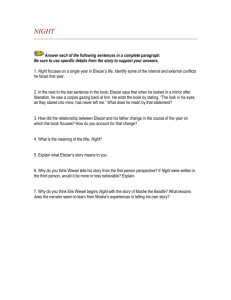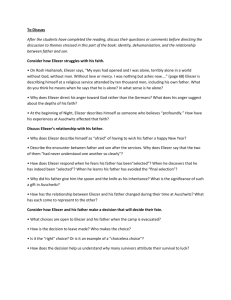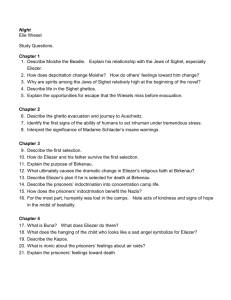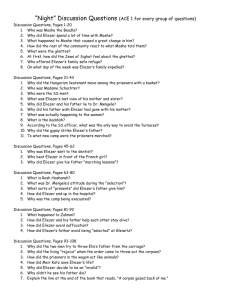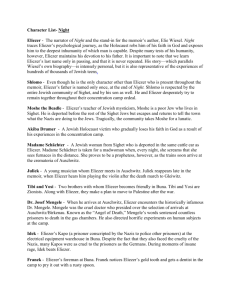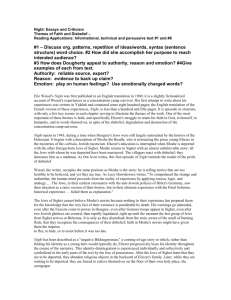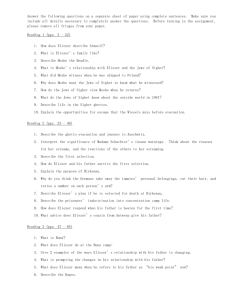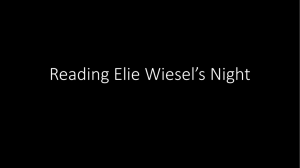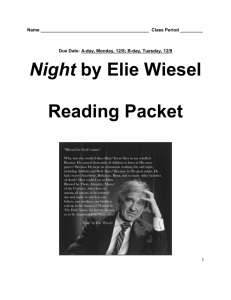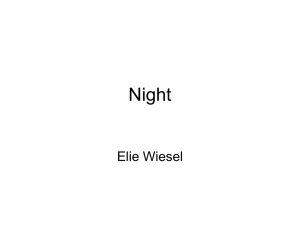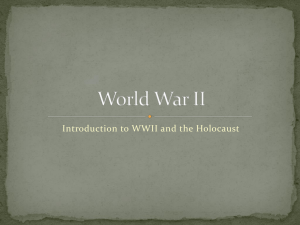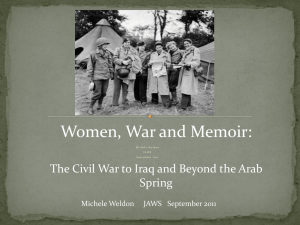Night Analysis Questions
advertisement
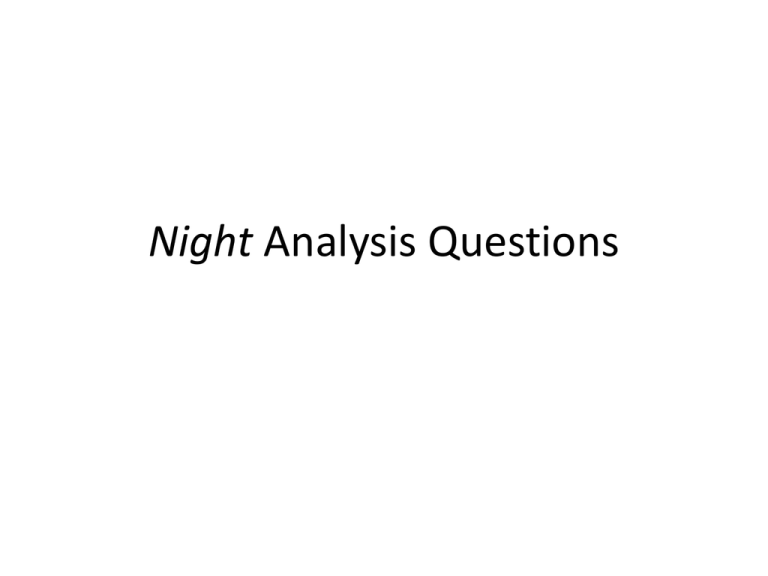
Night Analysis Questions Section 1 1. During a narration, the reader may learn a lot about a speaker based on the descriptions and observations the speaker makes about other characters in the novel. What do we learn about the speaker based on his description of Moishe the Beadle? 2. Explain the theme of the passage below and how it will be revisited throughout the memoir. […]He [Moishe the Beadle] explained to me, with great emphasis, that every question possessed a power that was lost in the answer … Man comes closer to God through the questions he asks Him, he liked to say. Therein lays true dialogue. Man asks and God replies. But we don’t understand His replies. We cannot understand them. 3. How does the following passage serve as foreshadowing in the memoir? And in the course of those evenings I became convinced that Moishe the Beadle would help me enter eternity, into that time when question and answer would become ONE. Section 1 4. Explain the community’s reaction to the expulsion of the foreign Jews from Sighet. 6. How did the people of Sighet respond to Moishe the Beadle’s tales? Why? 7. Wiesel uses several rhetorical strategies to narrate the events of the German invasion. Cite one example of rhetorical questions and one example of phrases used as sentences, then explain their significance to the memoir. 8. Explain the irony that Wiesel poses in the below questions? Annihilate an entire people? Wipe out a population dispersed thtoughout so many nations? So many millions of people! By what means? In the middle of the twentieth century! 9. Explain the effect of the juxtaposition of the following lines that serve as a beginning to the new section that begins on page nine: ANGUISH. German soldiers—with their steel helmets and their death’s-head emblem. Still, our first impressions of the Germans were rather reassuring. 10. What does the speaker mean when he states: “The Germans were already in our town, the Fascists were already in power, the verdict was already out—and the Jews of Sighet were still smiling.” 11. Explain the following line: “The ghetto was ruled by neither German nor Jew; it was ruled by delusion.” 12. Explain the symbolism and irony in the following statement: “The shadows around me roused themselves as if from a deep sleep and left silently in every direction.” 13. Using the following text as an example, what is the effect of Wiesel’s use of ellipses when the speaker is recounting a conversation? “Half asleep, he was staring at me, his eyes filled with terror, as though he expected me to burst out laughing and tell him to go back to bed. To sleep. To dream. That nothing had happened. It was all in jest …” 14. How should the reader interpret “tombstones” in the following line: “They began to walk without another glance at the abandoned streets, the dead, empty houses, the gardens, the tombstones…” 15. Explain the allusions in the following passage that relates Eliezer’s sighting of the Chief Rabbi as he makes his way out of the ghetto. Why does Wiesel include them in Eliezer’s narration? “It was like a page torn from a book, a historical novel, perhaps, dealing with the captivity in Babylon or the Spanish Inquisition.” Section 2 1. Explain the usage of the motif eyes at the beginning of section 2. How are Mrs. Schachter’s eyes described? What does this mean? Make you think of? 2. What one theme do you see prevalent in this chapter? Cite evidence to support your answer. 3. What were your thoughts, feelings, reactions to the cattle car testimonials? Be thorough. Section 3 1. What does the following line indicate about Eliezer’s emotional condition? How do we know that the emotion is universal? “The beloved objects that we had carried with us from place to place were now left behind in the wagon and, with them, finally, our illusions” (29). 2. Using your understanding of imagery in the following passage, explain how its use in this section highlights Eliezer’s memory of his final contact with his mother and sister. Explain the emotional contrast between the first two lines of the passage. “Eight words spoken quietly, indifferently, without emotion... I kept walking, my father holding my hand” (29). 3. Analyze the following passage: “‘Shut up you moron, or I’ll tear you to pieces!’ … True. We didn’t know. Nobody had told us” (30). Section 3 4. Read the following passage and explain how Wiesel interrupts the narration of the story to emphasize the truth behind what Eliezer witnesses. “Not far from us, flames, huge flames… ever since then, sleep tends to elude me?)” (32). 5. Explain the effect of the rhetorical questions for the paragraph on page 32: “I pinched myself.” 6. Explain the dramatic irony in the following statement: “Still, I told him that I could not believe that human beings were being burned in our times; the world would never tolerate such crimes …” (33). Why do you believe Wiesel includes this in his memoir? 7. In section three of the memoir, what insights into the Jewish religion and Eliezer’s response to his faith does the reader see? Section 3 8. Using the following quote, characterize Eliezer as he has changed. “For the first time, I felt anger rising within me. Why should I sanctify His name? The Almighty, the eternal and terrible mast of the Universe, chose to be silent. What was there to thank Him for?” (33). 9. Explain the significance in the following citation: “We were walking slowly, as one follows a hearse, our own funeral procession” (33). 10. What seems to be the constant concern for Eliezer? 11. “Freed from the barbers’ clutches, we began to wander about the crowd, finding friends, acquaintances. Every encounter filled us with joy—yes, joy: Thank God! You are still alive!” (35). Do you believe that the men will share these same sentiments as time progresses? Explain the irony in their statements. Section 3 12. How does Eliezer feel after being in the camp for one day? 13. Cite the examples of figurative language in the following passage and explain the effect that they have on the meaning. “A pause. He was observing the effect his words had produced. His face remains in my memory to this day. A tall man, in his thirties, crime written all over his forehead and his gaze. He looked at us as one would a pack of leprous dogs clinging to life” (39). 14. Explain the contrast of images that are used to describe the setting that Wiesel establishes during his description of the first days at Auschwitz found on page forty. What does the contrast convey to the audience? 15. Contrast Eliezer’s faith in God with Akiba Drumer’s faith. What can Akiba do for other prisoners but not for Eliezer? Section 4 1. In the memoir, a majority of the animal imagery is associated with the Jews. How does Wiesel alter the animal imagery in the description of Eliezer’s beating? Explain the purpose behind the change in images. 2. Describe Eliezer’s internal conflict while he watches his father getting beaten. What theme does this present? Why? Cite evidence. 3. When Eliezer sees Idek with the young Polish girl at the depot, what results? Analyze the description of the scene and explain how it is different than the other brutal scenes in the memoir thus far. Section 4 4. Explain the conflict that Eliezer faces as he is watching the Buna factory being bombed (60). 5. Explain the metaphor in the following line: “The last sound of the American plane dissipated in the wind and there we were, in our cemetery” (60). 6. How is the people’s response to the second hanging different than the response to the previous hangings? Explain the significance of this event for Eliezer in terms of his faith (64-65). Section 5 1. Read the following passage and discuss the rhetorical techniques and their effect on the meaning in the passage. “In front of me, there were only Tibi and Yossi. They passed. I had time to notice that Mengele had not written down their numbers. Someone pushed me. It was my turn. I ran without looking back. My head was spinning: you are too skinny … you are too weak … you are too skinny, you are good for the ovens … The race seemed endless; I felt as though I had been running for years … You are too skinny, you are too weak … At last I arrived. Exhausted.” 2. As winter begins, Eliezer is sent to the infirmary because of his foot. This section of the memoir is longer than many of the other sections and is much more descriptive. Why do you believe Eliezer devotes so much time on this memory? Why do you believe he is treated for his injury rather than being sent to the crematorium? Section 6 Write an 11+ sentence paragraph explaining how the theme self preservation versus family commitment is developed in this section. Be sure to cite textual evidence and thoroughly explain . Section 7 1. Describe and analyze the scene that demonstrates the true brutality of both the German laborers and the Jewish prisoners (101). Explain the usage of imagery and author’s purpose. How is the language used in this section different than the language used in similar situations of violence in the memoir? 2. Explain the significance in Wiesel’s choice to end the story of the father and son fighting for the piece of bread with “I was sixteen.”
